- Home
- Michael Dobbs
The Reluctant Hero Page 2
The Reluctant Hero Read online
Page 2
‘No, miss. And I’m sure glad of it. Why, what’d we have to think back on in our old age if we’d been – I don’t know. Bankers?’
She moved closer to Harry, squeezed his arm. ‘Harry Jones, there’s so much I don’t seem to know about you,’ she said softly. She made it sound like a challenge, one she was more than willing to take up. She didn’t see the flicker in his eye.
Jimmy Jackson was more than merely a doorman, he was the ambassador’s personal valet and knew how to deal with many kinds of situations, those that stretched from amusing an ageing duchess to diverting aggressive drunks, and that ability also enabled him to know when the time had come to extract himself. This was one of those moments. ‘You folks have a fine evening. I’ll see y’all later. Fix you that drink,’ he said, turning for the cloakroom.
‘You better,’ Harry replied. ‘Feeling I’m going to need it.’
The bolt slid back uneasily in its track. As the door swung open, Prisoner 7217, Extreme Punishment Wing, stirred, rubbing his eyes, struggling to focus. He rolled from his straw mattress, the only furniture in his stinking cell. It had been gnawed yet again by rats, but he took no notice. He had been here too long to care. He clambered to his knees.
It was many moments before he realized what was happening. It took time for everything nowadays, but that didn’t matter. Time was the only thing he had, yet it meant nothing. How long had he been here on the Punishment Wing? He had tried, in the early days, to keep track with scratchings on the mould-infested walls, but he’d been overcome by confusion after a couple of months as the mould grew back, so he had stopped. After that, he lost his grip on most things.
A voice penetrated the fog of confusion. ‘Mr Mayor,’ it greeted, almost jovially.
That was right, he remembered now. He was the mayor, from one of the towns twenty miles south of the capital. How considerate of the visitor to remember. This voice, this new man, stood beneath the single bare bulb that lit the cell, and the yellow light seemed to strip him of all humanity, making his appearance pale and ethereal, like – an angel. Or a ghost, perhaps. He’d called him Mr Mayor, not 7217. The prisoner remembered his number more clearly than his name. So much had been lost along the way.
The angel seemed to have read his thoughts. ‘Mr Mayor,’ it repeated, ‘I wanted you to know that I am a man of my word.’
Had he met this pale-faced apparition before? the prisoner wondered. He couldn’t decide, every thought led to confusion. From the corner of his eye the prisoner saw something move, something dark, elusive, a rat, fleeing the disturbance. In the early days he had tried to block the holes in the damp stone walls with straw from the mattress and handfuls of hardened filth, but it had been pointless. There were too many holes, and just too many rats.
‘You remember? The promise I gave you, Mr Mayor?’ the angel continued.
Prisoner 7217 nodded fitfully, not meaning it. It had become his default response to anything they said.
‘I said you had no need to worry, that we would never execute a mayor.’
He looked up from all fours and nodded again, this time more purposefully. A memory came back, confirming what the angel had said. It was what had kept him going all this time.
The angel slowly pulled back the sleeve of his grey serge uniform and consulted his wristwatch. He smiled. ‘But in a few minutes, your term of office will be over. You will no longer be mayor.’
Yet again Prisoner 7217 nodded, his head drooping as he struggled with the weight of this new thought.
‘Happy New Year,’ the angel whispered. Then he turned and left.
In the great hallway of Winfield House, beneath crystal chandeliers that were reflected in huge gilt mirrors hanging on three sides, the ambassador waited with his wife to greet their guests.
‘Why, Harry Jones. Welcome back to our little home,’ he exclaimed, his face lighting up. No one but a truly wealthy man could have called Winfield House a little home and got away with it, but David Bracken was one of those few. He was a tall, ascetic man who had made several fortunes in the information-technology sector and spent much of it wisely, some of it on the recent presidential re-election campaign. The post to the Court of St James’s had been his reward. Yet Harry quickly noticed that despite the splendour of the surroundings there was a muted atmosphere to the occasion. In previous years Harry could recall encountering many kinds of entertainments – a soprano from the New York Metropolitan Opera, rooms filled with life-sized Disney characters, an entire wall filled with tropical flowers. But now these flourishes were missing. And it was Californian chardonnay rather than champagne. The ambassador apologized. This was to be a modest affair, he explained, no extravagance, a subdued celebration to match the mood of such tightfisted times. He always carried a little frown of concern around with him and had always been regarded as the serious type, which was considerably more than could be said of his wife. In many people’s view she hadn’t proved to be one of his better investments.
‘Why, Harry,’ Sonia Bracken exclaimed, stretching up to peck his cheek and revealing more than a modest mound of freckled flesh as her husband concentrated on greeting Bernice. ‘I haven’t seen you for such a long time.’
They both knew Harry had been avoiding her. The last time their paths had crossed, in an overheated seaside hotel during a political conference, she had made it abundantly clear how keen she was to do her bit for the Anglo-American alliance, and how willing she was to be both inventive and discreet about it. She’d muttered something about increasing the size of his majority. When Harry had declined her offer, she had taken umbrage, like any rejected woman, and now her eyes, once filled with lust, were as cold as uncut diamonds. ‘I’ve missed you,’ she lied, ‘but what’s this? Why, Harry,’ she said, carrying out a close inspection, ‘you have put on weight.’
Well, a couple of pounds, maybe, but that was none of her damned business. Anyway, he’d been busy – or, more accurately, distracted these past couple of months by . . . by what he wasn’t entirely sure. There seemed to be an emptiness that had crept into his life and neither his job, nor Bernice and certainly not the overflowing Sonia Bracken could fill it. Harry’s eyes dropped, first to the remarkable creation at her neck that he suspected had come straight from a showcase at Tiffany’s, then beyond, until they were loitering in the pink chasm between her over-sculpted breasts.
‘At least it’s all my own,’ he whispered, moving on. Two guards dragged him from the cell. He stumbled, wasn’t able to walk properly, couldn’t lift his feet, he hadn’t used his legs in so long. He was confused, and afraid.
As he passed the other cells, Prisoner 7217 forced his head up. Through the narrow bars of the doors he saw the faces of other prisoners, grey, like dirty chalk, their eyes flooded with pity, and with fear, fixed upon him as they watched their own futures being dragged past. Their cracked lips fell open but they uttered not a sound.
He’d heard that men often fouled themselves when they died violently. It was one of many whispers that scuttled around with the rats. He prayed it was not true. He had a deep, almost animalistic desire to stand tall, to make a good death of it, for his family, and particularly for his son, Daniyar. Yet as he stumbled once more he ridiculed his own stupidity. A good death? What total shit! What in God’s name was he thinking of? It wouldn’t make any difference how he died, once he was dead.
As for his family, they would never know. His son was only five, wouldn’t even be able to recall his father’s life, let alone its end, a life that was nothing but a grain of wheat, blown by the passing wind.
Would there be pain? He’d often asked himself. Come to that, would there be anything at all? He wasn’t much of a believer, couldn’t pretend he expected to wake up in Paradise tended by several dozen virgins, but he could hope, always hope, force back the liquid that was laying siege to his bowels and find something solid to cling to. He stamped his feet on the stone floor in anger until he could feel pain, shouting at them to work. He wasn’t going
to be dragged any further. And as he levered himself upwards he gave a half-choked cry of triumph. Yes, it did matter how he died, not to anyone else but for himself. He was going to die as he hoped he had lived, cursing them all, defiant to the last.
He was scrabbling around inside his head, snatching at thoughts, images, grabbing at those things he knew for certain and which might give him something to lean on. He was aware of a long passage that lay ahead. The stones of the old walls were damp, uneven, the ancient light fittings casting lurid shadows that flickered darkly before him as he passed, then were gone, like life itself.
He made out a flight of stone steps at the end of the passage that led down to a wooden door built of ancient planks. The hinges swung open quietly as the door was drawn back, flooding the passage in front of him with unexpected brilliance. He blinked in the sudden rush of light; it was as though the gates of paradise were beckoning. He tried to laugh, find some comfort in the thought. Then, once again, he saw the pale features of the angel.
They both drank more than was good for them. While Jimmy Jackson served Napa chardonnay to most of the guests, he always seemed to have a crystal glass filled with some fine single-barrel bourbon on his tray when he passed Harry, which was often. And as Bernice grew relaxed, she let her own defences down, while failing to notice his.
‘To the new year,’ she said softly, raising her glass, her other hand snaking around his waist and pulling him closer. ‘I hope it’s going to be a very special one, Harry.’
‘What way?’
‘You and me.’
The words seemed to roll into one.
‘You make it sound like . . .’ He struggled to find the right description, but she wasn’t to be denied.
‘Like Bonny and Clyde? Yes, and bubble and squeak, and—’ She was about to say love and commitment, and wasn’t it about time they got their stuff together, but something held her back. ‘That’s how I feel about us,’ she whispered. Her eyes had filled with emotion, but as she looked up into his, she realized she had made a most terrible mistake. It was as though she had taken a telescope expecting to see the stars and had discovered only the deepest, most intense black hole that sucked everything out of her night.
For a moment neither of them spoke. There was no point. She knew that words wouldn’t change a thing. And even before he could squeeze out an apology she had broken away and disappeared in the direction of the powder room. It wasn’t her fault. She wasn’t to know that tomorrow would be the tenth anniversary of Julia’s death.
Then Jimmy was at his side once more, his tray bearing yet another bourbon of quite exceptional proportions and his eyes full of understanding.
‘How many tumblers of this stuff make you a social drinker, Jimmy?’
‘Two, I guess.’
‘And an alcoholic?’
‘Three. And that’s your third.’
‘In which case, I’m already there and it makes damnall difference. Geronimo, Jimmy,’ Harry muttered as he emptied the glass in one. ‘And room for another before you throw me out of here, I guess.’
It was over. Not just the evening but Bernice, their affair, another little chunk of his life. It was approaching midnight, no point in waiting, time to leave, there was nothing more for him here. And he was beginning to feel the effect of all the bourbon. He made his way to the washroom, which he was glad to see was empty. He took his time, relieved that he could be on his own at last, and was washing his hands when the door swung open. Harry didn’t look up, not wanting to engage in small talk, concentrating on scrubbing his hands.
‘Hello, Harry,’ a voice said. ‘So this is where you’re hiding. I’ve been looking for you everywhere.’
Harry looked up to find the pale eyes of Hervé d’Arbois staring at him. He was a man close to seventy years of age, not tall but most elegantly presented. The hair was gently silver, the nose aquiline, the fingers long and elegant, giving the impression that they had never strayed far from a keyboard. The voice had a gentle Parisian veneer, like so much of the rest of him. The cufflinks were in the form of gold Crosses of Lorraine. Hervé d’Arbois was one of those ubiquitous Frenchmen who had been quietly running the country for the past hundred and fifty years, no matter what the colour of the government. His life represented a waltz through the corridors of privilege: the Sorbonne, two years at ENA – the École Nationale d’Administration in Strasbourg – balanced by national service in Algeria during the bitterest days of the war for independence. Later he’d served a term as a European Commissioner. D’Arbois had spent a lifetime seducing power. Harry had got to know him in Brussels where he discovered that a single phone call from d’Arbois could achieve in a matter of minutes what months of laying siege to the European Parliament could not. A most useful man, was Hervé, one to whom people listened. But not Harry, not tonight. The bourbon had kicked in, as though it had a point to prove, and his temples were throbbing. He wasn’t in much of a listening mood. Harry splashed water on his face from a running tap.
‘It’s simply that I believe you know him. At least, you knew him,’ d’Arbois was saying as Harry at last emerged from the waterfall.
‘Sorry, didn’t catch that. Who?’ Harry muttered as he headed in the direction of the hand-dryer. The noisy rush of hot air forced d’Arbois to wait until he was done.
‘Zac. Zac Kravitz.’
Harry’s heart began to race in alarm. It wasn’t simply the alcohol.
‘Harry, I am all but retired, a man of leisure, but I still hear many things. Old habits, you understand. And the word is that your friend has got himself into – as you say – a spot of bother. Rather a bleak spot, too.’
‘But . . . how? Where?’ Harry demanded in confusion, the words echoing back accusingly from the tiled walls.
‘Ta’argistan.’
Harry, his brain cells already battered, bruised a few more trying to recall where the place was.
‘I’m not familiar with the detail,’ the Frenchman continued, ‘but it seems Mr Kravitz has been moving in the murky commercial underworld these past few years. Mercenary work, commercial intelligence, something of the kind. The sort of stuff that leaves dirt under the fingernails.’ D’Arbois sighed, producing a brilliant white handkerchief and polishing his rimless spectacles with meticulous care.
‘Zac, he . . . sort of went AWOL. Hid himself away. I lost track,’ Harry mumbled, partly in explanation but also in apology. He should have kept tabs on him, but it had all been so long ago, in another life. Even P.J. had upped and left him. ‘He always was a bit of an awkward bugger.’
‘Which is why it seems no one wants to help him. Not his government, certainly not his business associates.’
‘But what the hell’s he done?’
‘I only pick up –’ the Frenchman waved his glasses in a vague circular motion – ‘whispers. Rumours. But he seems to have upset someone. Someone very important. His associates don’t expect to see him again. It happens, you know, in a primitive place like Ta’argistan. Get yourself in trouble with the government there and – poof! – you disappear. I only mention it because I seem to remember that you were a friend of his, once.’ He delayed delivering the final word, as though it made the matter of no importance.
Harry stared into the mirror. The antiseptic lighting seemed to have bleached all the colour from his face, yet at the same time highlighted the creases. How could it do both? he wondered in confusion. From beyond the door, at the outer limits of his storm-tossed senses, he could hear the crowd had grown suddenly still, and a clock was beginning to chime.
‘We should go and join them, Harry,’ d’Arbois said, and before Harry knew it he was gone. Through the part-open door there swept a tide of cheering as the clock struck midnight. He pushed a few stray strands of his hair into place and followed the Frenchman, but the other man had already disappeared, lost in the throng of celebration. As Harry scanned the room, he spotted Bernice. She was in the arms of a commercial counsellor from the Spanish Embassy. The energy o
f their enthusiasms suggested something more intense than an exchange of diplomatic courtesies. So, she was a survivor, nothing wrong with that. His fault, anyway. And she wouldn’t be needing a lift home. Harry stumbled for the door.
In his mind he was walking through a meadow. He was panting, filling his chest with barrels of cool mountain air that seared his lungs; he’d been racing with his elder brother, Chingiz. He’d won, his first time. He was growing, getting quicker, had taken Chingiz by surprise, a shortcut through a thicket of lucerne. The sharp blades had cut his bare feet, which now stung furiously, but it had been worth it to beat his brother. They had run from their home to the river that was gorged with spring melt water and which thundered down the valley, dragging brilliant pebbles and even large boulders with it. A profusion of flowers clogged the banks, forming a blanket beneath the blossoming rosewillows, whose branches bent towards the cascade of tumbling water. At last, winter had surrendered.
As he turned, in the distance he saw his grandmother, bearing a pitcher of sour milk and a headscarf bulging with bread. She had been the one who raised him, while his mother spent her days in the fields. Now she was drawing closer, beckoning to him.
He held it all together, kept his thoughts and fears from running amuck, even when they bound his hands behind him and kicked him up the rough wooden steps of the scaffold, right up to the moment they began mocking him. He heard them wagering money on whether he would be a ‘stiff-dick’ – one of those poor wretches who, at the bottom of the rope, somehow got an erection. As he heard their laughter he stumbled, fell, overwhelmed by disgust. How could they? They wouldn’t put a dog down like this!
He picked himself up and looked towards his destination at the top of the stairs. His eyes came to rest on the noose. It held him like a cobra’s eye. It seemed remarkably heavy to him. Rough twisted hemp. Almost an inch thick. With a double-tied knot. Allah O Akbar! God is great! May He be merciful . . .

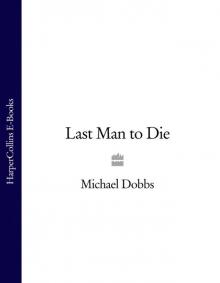 Last Man to Die
Last Man to Die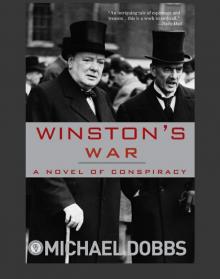 Winston's War
Winston's War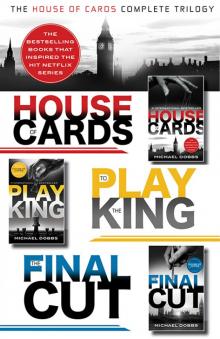 The House of Cards Complete Trilogy
The House of Cards Complete Trilogy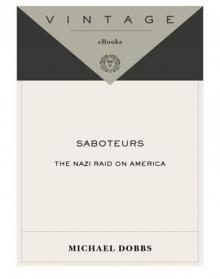 Saboteurs
Saboteurs The Touch of Innocents
The Touch of Innocents WC02 - Never Surrender
WC02 - Never Surrender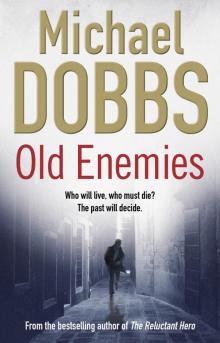 Old Enemies
Old Enemies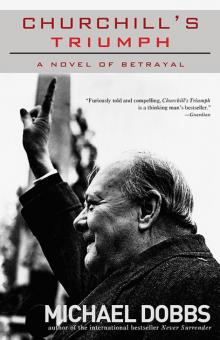 Churchill's Triumph
Churchill's Triumph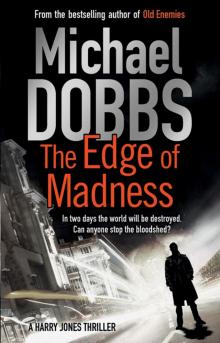 The Edge of Madness
The Edge of Madness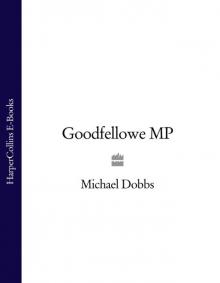 Goodfellowe MP
Goodfellowe MP The Final Cut
The Final Cut Whispers of Betrayal
Whispers of Betrayal Churchill's Hour
Churchill's Hour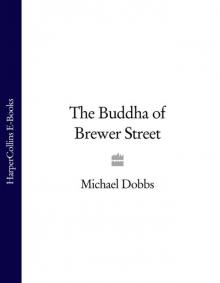 The Buddha of Brewer Street
The Buddha of Brewer Street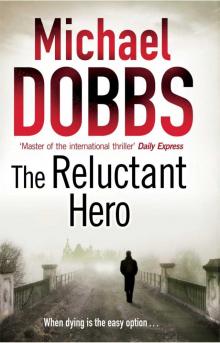 The Reluctant Hero
The Reluctant Hero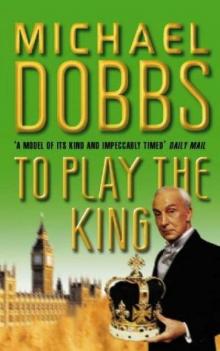 To Play the King
To Play the King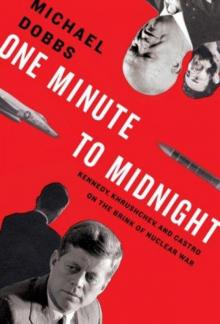 One minute to midnight
One minute to midnight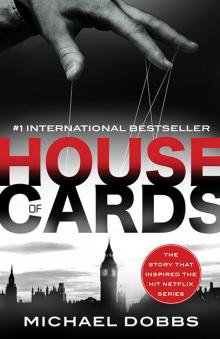 House of Cards
House of Cards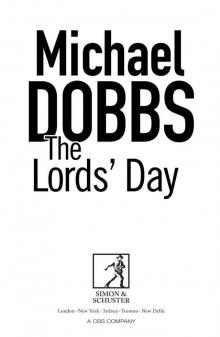 The Lords' Day (retail)
The Lords' Day (retail)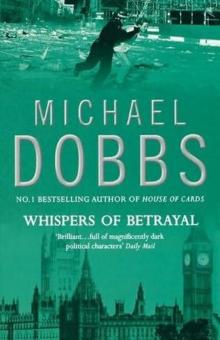 Whispers of betrayal tg-3
Whispers of betrayal tg-3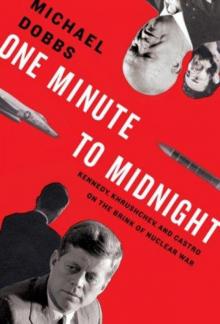 One minute to midnight: Kennedy, Khrushchev, and Castro on the brink of nuclear war
One minute to midnight: Kennedy, Khrushchev, and Castro on the brink of nuclear war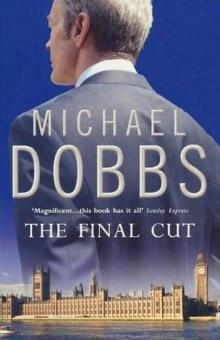 The Final Cut fu-3
The Final Cut fu-3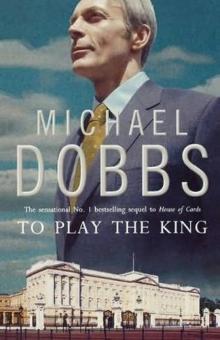 To play the king fu-2
To play the king fu-2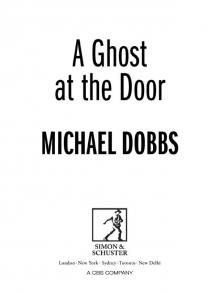 A Ghost at the Door
A Ghost at the Door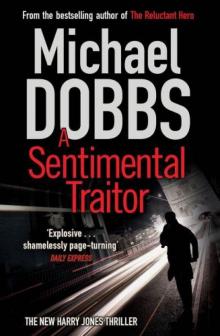 A Sentimental Traitor
A Sentimental Traitor